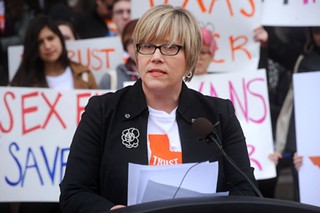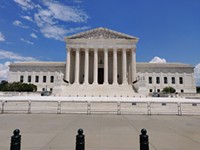Fetal Burial Rules Punted to Jan. 27
Sparks says "no question" rules fail to advance public health
By Mary Tuma, Fri., Jan. 6, 2017
U.S. Judge Sam Sparks again temporarily blocked a proposed state health department rule that would force women to bury or cremate their fetal and embryonic remains after an abortion, miscarriage, or ectopic pregnancy (regardless of gestation period) following a two-day hearing which began in Sparks' Downtown courtroom on Tuesday, Jan. 3. Sparks had temporarily halted the rule from taking effect as previously scheduled on Dec. 19, awaiting a full trial. The rule will now remain blocked until Jan. 27; Sparks plans to make a final decision earlier that week.
Abortion providers, represented by the Center for Reproductive Rights, relayed their fears about the "vaguely worded" rule and the burden it would place on patients and providers, already struggling in the wake of damage caused by House Bill 2 abortion restrictions. Longtime Austin OB-GYN and abortion provider Dr. Lendol "Tad" Davis of both Brookside Women's Medical Center and Austin Women's Health Center called the rule "very unreasonable," "cruel," and "emotionally traumatic" for his patients. "There is no benefit for the patient or the state," he said. In his more than three decades of medical practice, Davis could recall less than four instances a year of women requesting a fetal burial after an abortion, and only one request (ever) from women who miscarried.
Amy Hagstrom Miller of Whole Woman's Health said companies her clinics contract with have faced intimidation and threats from anti-choice activists at children's schools, the grocery store, and even church. Likewise, Davis said his Austin practice was in jeopardy of shuttering due to a vendor pulling out after anti-choice threats. As abortion providers have identified only one cremation company that will offer services that comply with the updated regulations at a reasonable cost, they worry that business will similarly be targeted, forcing health clinics out of commission. Both Miller and Davis know the impact of arbitrary abortion restrictions: HB 2 forced three Whole Woman's Health centers to close, including its flagship clinic in Austin, while Davis' Killeen center shut its doors.
Missing the point that a right is no longer viable if there is no actual access to it, state attorney John Langley repeatedly asserted that the rule does "not regulate" women's bodies or their right to an abortion, only health facilities. While with one hand the state sought to paint plaintiff witnesses as ideological, they used the other to point to an offer by the Texas Catholic Conference of Bishops to pay for burial services as a possible low-cost solution for providers. However, as Miller and Davis both noted, not all patients are Catholic, making the service a religious imposition. Moreover, economist Dr. Anne Layne-Farrar noted, the Catholic group has a vested interest in shutting abortion clinics down, making the offer inherently risky. Plaintiff testifier Rev. Dr. Debra Haffner told the court the rule improperly enshrines a "specific view" of personhood (that life begins at conception) not shared by most religions.
State witness Jennifer Sims, deputy commissioner at the Texas Department of State Health Services, indirectly revealed the state's weak defense: When asked how the rule enhances public health, Sims replied with ambiguity, saying, "When things are more clear, public health is ensured." Sims was also unable to point to any instance in which depositing fetal tissue in a sanitary sewer or landfill (the current method used by clinics) caused disease or infection, ostensible problems the department has claimed to address with the regulation. That's because, as admitted by state officials themselves, the goal of the rule is to instead protect the "dignity of the unborn," and, as providers argued, shut down abortion clinics.
During closing arguments Sparks appeared frustrated by state attorneys, saying there is "no question" the rule doesn't advance public health. Sparks told attorneys there was no evidence showing the regulation is anything other than "100 percent political," especially given the fact it was published just a few days following the U.S. Supreme Court's reversal of HB 2. See "Judge Sparks Critical of State's Defense of Fetal Burial Rule" for a full recap of the two-day hearing.
Got something to say on the subject? Send a letter to the editor.
Read more of the Chronicle's decades of reproductive rights reporting here.









